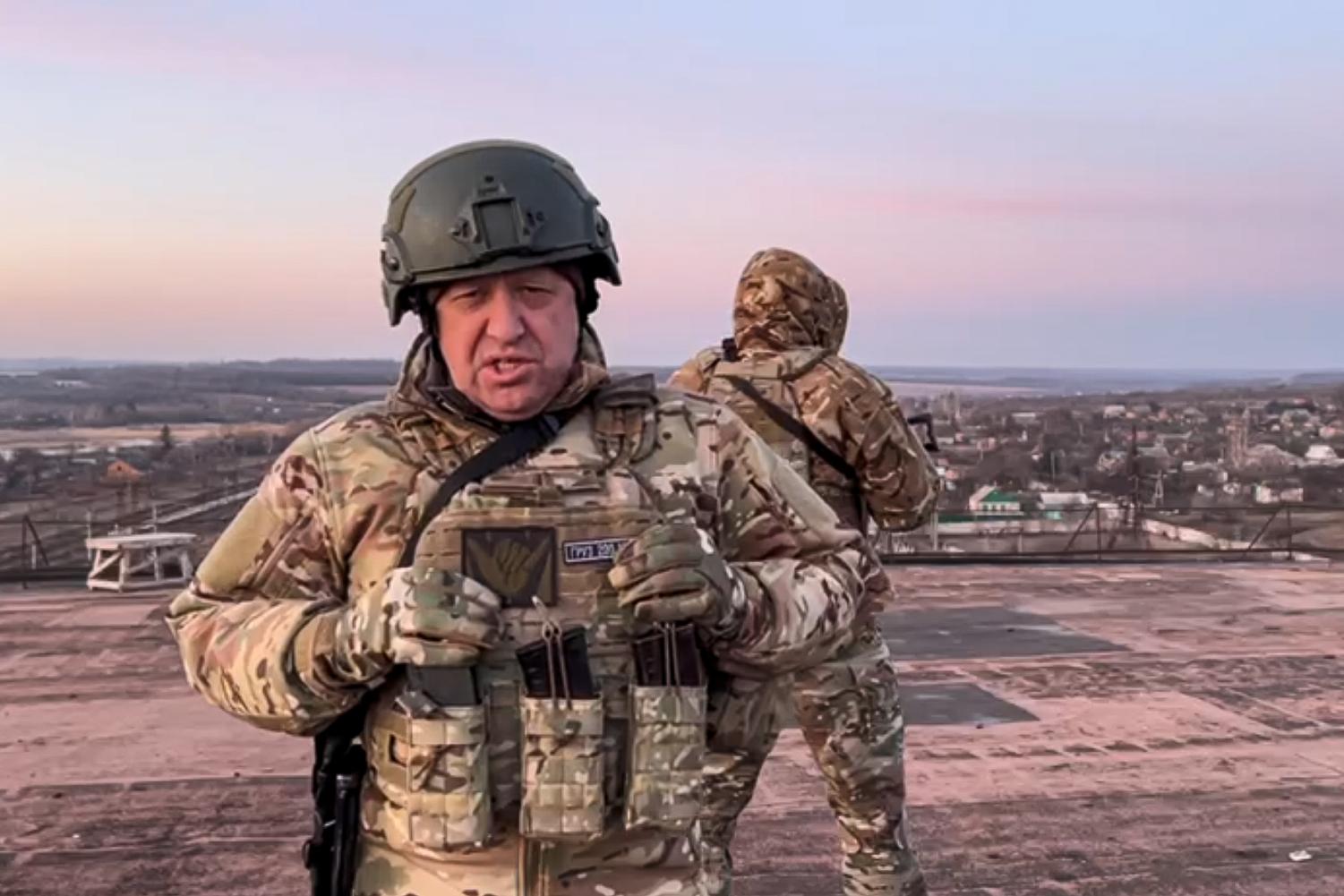Opinion | A war crime is a war crime


In this handout photo taken from video released by Prigozhin Press Service on Friday, March 3, 2023, Yevgeny Prigozhin, the owner of the Wagner Group military company, addresses Ukrainian President Volodymyr Zelenskyy asking him to withdraw the remaining Ukrainian forces from Bakhmut to save their lives, at an unspecified location in Ukraine.
The Wagner Group, a private military company based in St. Petersburg, Russia, has sent as many as 50,000 fighters to frontlines in Ukraine. As the war passes the one year mark, Putin has increasingly relied on this private military company — or PMC — to reinforce government troops. Russian troops and Wagner contractors meet similar grim fates in battle.
The Biden Administration has rightly called for war crimes investigations and trials for Putin and members of his army, especially after the horrendous mass killings in Bucha last year. The International Criminal Court has even issued an arrest warrant for Putin himself.
While these actions are much needed, they are incomplete if they neglect to investigate and try members of Wagner Group.
The Wagner Group, headed by Putin’s wealthy caterer Yevgeny Prigozhin, is a lethal organization responsible for disruption, terrorism and brutality in Ukraine, the Middle East and North Africa. With government backing, Wagner Group has meddled in foreign political systems, engaged in anti-Western disinformation campaigns and has provided transactional security support to corrupt regimes in Africa for access to commodities like gold, diamonds and uranium. Outside of Ukraine, Wagner is most disruptive in Africa’s Sahel region, an emerging hotbed of terrorism.
It’s imperative that the U.S. and the international community leave no stone unturned in the pursuit of justice and accountability for crimes against humanity. The U.S. can’t afford to overlook the Wagner Group’s crimes based on ulterior political objectives or the regulatory complexities surrounding PMCs. It doesn’t matter if the Wagner Group is a nonstate actor. A war crime is a war crime, and the U.S. must act accordingly.
The Wagner Group’s activities in the Sahel pose a significant challenge to U.S. foreign policy. The U.S. wants to deepen defense and diplomatic engagements throughout the larger sub-Saharan region, focusing on combating violent extremism in the region. Wagner Group security personnel have committed human rights violations in military operations conducted by client governments, which can foment unrest and contribute to local grievances that fuel extremism.
Without accountability mechanisms for PMCs, Wagner Group personnel contribute to an unstable regional security environment that leads to their continued service. Persistent instability makes U.S. regional engagements untenable. Thus, the Wagner Group presents a political burden as well as a moral concern.
The Wagner Group’s activity in Ukraine paints another grim problem. Once the war began, Prigozhin went to Russian prisons to fill ranks. Wagner peaked at 50,000 members, mostly former soldiers from Russia’s elite regiments. As much as 80 of these men were drawn from prisons, whom Prigozhin offered pardons in agreement to fight in Ukraine. The U.S. estimates that Wagner has lost nearly 30,000 men to death or injury in Ukraine, mostly in the contested city Bakhmut.
While it’s difficult to separate Wagner Group atrocities from those of the Russian military more generally, there are cases that provide startling insight to the depravity of war.
A former Wagner unit commander in Ukraine admitted that the group is responsible for war crimes in Ukraine. After fleeing the battlefield, the former commander revealed how Wagner troopers were regularly executed to set an example for those who might refuse to fight. A Wagner defector who allegedly switched sides was executed by repeated blows with a sledgehammer by other Wagner members. German intelligence reports indicate that Wagner Group units played a leading role in the atrocities at Bucha, where countless civilians were tortured and murdered.
The Wagner Group is clearly culpable for atrocities in Ukraine to add to its human rights abuses in Africa. International actors have deservedly called out Wagner for its subversion. The U.S. has sanctioned certain Wagner members and designated the group as a transnational criminal organization. Again, such steps are welcome yet insufficient.
The U.S. could impose stronger sanctions on Wagner by designating it as a foreign terrorist organization, or FTO. Current sanctions target Prigozhin and a limited set of Wagner’s associates, though an FTO designation would criminalize individual and commercial material support to Wagner. Such action has bipartisan support in Congress, though the Biden Administration has resisted due to concern over potential effects in Africa. Wagner supports weak militaries in Africa and provides a sense of stability to its clients. If heavy sanctions from the U.S. and international community cripple Wagner Group operations in the region, these African militaries will be vulnerable to collapse. This could lead to further instability and violence in the region, significantly jeopardizing U.S. foreign policy goals.
According to Congress proposed legislation, the U.S. could designate Wagner as an FTO while waiving sanctions in the interests of U.S. national security. This crucial specification should ease Biden Administration concerns about an FTO designation and compels the president and secretary of state to reconsider its resistance.
The U.S. should support actions that hold Wagner Group members accountable for their crimes by legal means. While Wagner’s commercial status challenges the regulatory regime, there are international and national laws that regulate mercenaries. For instance, Ukraine ratified the International Convention against the Recruitment, Use, Financing and Training of Mercenaries, affirming the illegality of mercenary forces under international law. Ukraine could try to prosecute Wagner Group members under its national mercenary laws, to which the U.S. could feasibly offer public support or expertise.
The U.S. could also rely on international norms to ground its claims against Wagner Group. International humanitarian law applies to all parties in war, including PMCs. Thus, the Wagner Group must adhere to norms such as discrimination of noncombatants. The U.S. could also attempt to prosecute Wagner Group members or leadership for war crimes or crimes against humanity under the principle of universal jurisdiction. But it’s hard to imagine the U.S. successfully prosecuting members of Wagner Group when it refrains from designating them a terrorist organization. The U.S. could at least indicate support for other international prosecution efforts through the International Criminal Court or International Court of Justice.
As the war in Ukraine drags on, the U.S. should, at minimum, uphold its sanction regime against Wagner leadership. It should investigate war crimes committed by Putin’s troops and Wagner fighters. In the long term, the U.S. should push for stricter accountability measures and regulation of PMCs to ensure that impunity for atrocities is a relic of the past.
The U.S. should recognize the significance of taking charge in holding Wagner accountable given its own bloody and disgraceful history with private contractors in war. The U.S. can’t change the past, but it can stand on the right side of history by treating all war crimes as war crimes, regardless of who signs the perpetrator’s paycheck.
Grant Van Robays writes primarily about international affairs, social issues and basic human rights. Write to him at grv11@pitt.edu.
Recent Posts
Police blotter: Mar. 27 – Apr. 2
Pitt police reported a theft by deception at Litchfield Tower B, a missing phone on…
Doug Swanson: Uncovering injustice and shedding light on the ‘weird’
Very few people remember presidential candidates like Pete du Pont or Paul Tsongas. However, Doug…
Ian Labatch: A Panther Pitt leader and icon ‘bathed in blue and gold’
The “Pitt Pope” is a title well-known throughout the Pitt community. He who wears the…
SGB introduces new governing code bill and addresses rumors of ICE on campus
At its weekly meeting at Nordy’s Place on Tuesday, Student Government Board introduced an omnibus…
Opinion | School should be in the summer
Although this may be controversial, I believe that from this data, it is evident that…
Weathering the storm: Pittsburgh teams have tackled some of the toughest environments
The end of the year in western Pennsylvania is always marked by two things —…

